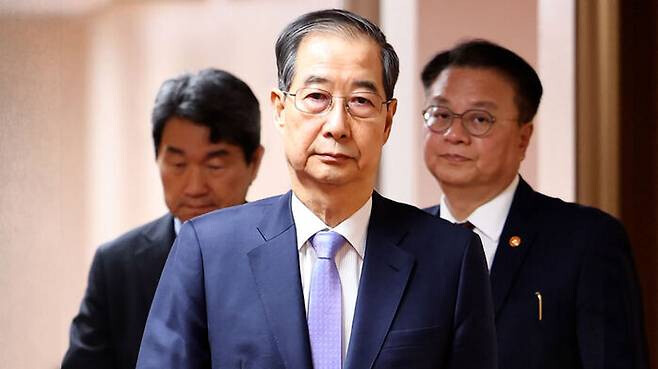
In a move that has ignited widespread criticism, acting President and Prime Minister Han Duck-soo officially announced his resignation and entry into the presidential race on May 1st. This decision follows the tumultuous period marked by the declaration of an illegal martial law on December 3rd and the subsequent impeachment of former President Yoon Suk-yeol, painting Han's choice as an unprincipled pursuit of personal ambition over national interest.
Han's announcement has been met with accusations of abandoning his responsibilities as the acting president and overlooking the broader accountability for the Yoon Suk-yeol administration's governance. Critics argue that his actions have further eroded public trust in the government and exacerbated instability stemming from frequent leadership changes.
In his address to the nation from the Seoul Government Complex, Han Duck-soo failed to offer a direct apology or reflection on the illegal martial law and the impeachment crisis. He merely expressed "deep sorrow for the conflicts and confusion experienced by each and every citizen." This omission is widely interpreted as a calculated move to avoid direct responsibility for the events, considering his position as the sole Prime Minister throughout Yoon's three-year term. It also aligns with his strategic approach to not alienate the conservative base, especially as he contemplates a potential coalition with the People Power Party (PPP) candidate.
Despite his attempts to distance himself, Han Duck-soo's role during the martial law crisis has placed him under intense scrutiny. Although he claimed to have opposed the declaration of martial law during the cabinet meeting, his position as the Prime Minister renders him accountable for the overall governance of the Yoon Suk-yeol administration. Critics argue that he lacks the moral standing to run in an election triggered by Yoon's impeachment.
The appropriateness of his candidacy has also been questioned, given that he symbolizes the systemic failures of the Yoon Suk-yeol government. Kim Jong-in, former interim leader of the PPP, expressed his disapproval in a CBS radio interview, stating, "It is highly abnormal for him to be considered a presidential candidate in the eyes of ordinary people."
Han's decision to step down from his "crucial role" as acting president to pursue personal political ambitions has drawn sharp criticism for prioritizing self-interest over national stability and the public good. This move has also necessitated another transition to an "acting deputy prime minister" system, further destabilizing the government and potentially damaging international confidence.
Moreover, Han's entry into the presidential race sets a problematic precedent, where a caretaker leader becomes a candidate. Concerns have been raised about the potential politicization of government affairs during his tenure as acting president.
The impartiality and legitimacy of Han's past decisions are now under renewed scrutiny. Accusations of abusing his authority for political gain, especially in light of his use of the presidential veto on eight bills passed by the National Assembly, are expected to intensify.
Public sentiment overwhelmingly opposes Han Duck-soo's presidential bid. A KBS poll conducted by Korea Research from April 22nd to 24th, involving 3,000 adults nationwide, revealed that 70% of respondents were against his candidacy.
[Copyright (c) Global Economic Times. All Rights Reserved.]






























